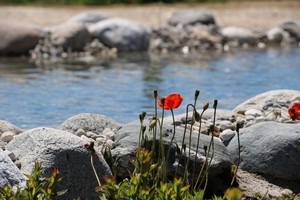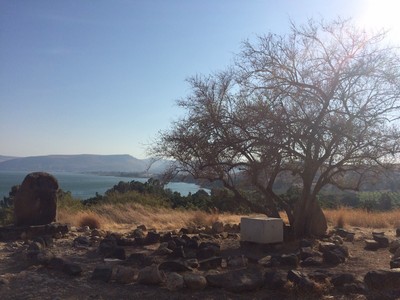Regenerations/12 - Believe it or not, in working for peace you can meet the Father
by Luigino Bruni
published in Avvenire on 18/10/2015

Saint Paul, Letter to the Romans, 8
There are many wars being fought on our planet, in our cities, in our neighbourhoods. The weapons are many and varied, but all of them produce only dead or wounded people and destruction. The millennia pass, but a brother continues to repeat to his brother "we go to the fields."
But whenever we start building peace again after conflicts, Abel returns to life, Adam walks again with Elohim in the garden of the earth, we can look "eye to eye" at each other in full reciprocity and with absolute gratuitousness. Every time we build and rebuild peace, our action also extends to creation, nature, the earth. And when we stop being its "keepers" (guardians) and deny peace, then the earth, animals, plants are injured, killed, humiliated, dragged into the vortex of our violence innocently. We see this more and more clearly every day.
Peace, shalom, is a great biblical word. It is among the most common, severe and exacting ones. The first covenant of Elohim with men comes to restore an original peace-happiness that was denied, in order to regenerate the primordial shalom betrayed by Cain's sin and by those of his equally atrocious children. It took a first peacemaker, Noah, for the rainbow to shine again over the earth, to make the re-creation of the world and of men possible. Peacemakers are always builders of arks to save a failed humanity. They are righteous men who feel a call to leave their land to save the land of all. If the world still lives despite all the evil that we generate, it is because Noah has never stopped building arks. The prophets and the many "blessed ones" in history have kept the rainbow in the sky by never stopping to build peace on a ground that has always been bathed by the blood of brothers. Noah's hand and that of the boat builders of peace has until now been far stronger and more creative than the hands of Cain and the owners of warships.
Peacemakers are not promised the earth, or the vision of God, or mercy. They are promised only a name: "They shall be called sons of God." It is, however, an immense name, the biggest of all, and only used for them. Peacemakers are conciliators, those who reunite broken relationships, those who spend their lives solving the conflicts generated by others. They leave their own peaceful life behind in order to make other people's lives more peaceful. Peacemakers, the builders of this biblical shalom, become what they are by vocation only. It is not just a matter of generosity or altruism. One can dedicate one' own life for the shalom of others and of all only if a strong voice calls them to do so from deep inside. Building peace is never just a job, even when the construction and reconstruction of peace is part of our job. These voices, these calls within cannot be resisted: they are highly effective. And we cannot resist even when we do not know by whom and where the voice that calls us comes from: to be peacemakers it is enough to hear and respond to it.
Our time knows many forms of war, and therefore it also knows many ways of building peace. But if the universal flood does not come back and life goes on, it's because inside the wars there is someone who continues to build peace, to insert stem cells into the body to regenerate it - or at least not to let it die. Someone that while the lobbyists of gamble fight their wars against the helpless poor tries to sabotage some of their "game", to build field hospitals for treating the wounded, to meet with their general to beg for a peace that never arrives. Peacemakers are also those who suffer because they cannot build an impossible peace and yet they do not give up. Even an impotent and failed peacemaker remains and deserves to be called a peacemaker. We do not know who the ones are that form majority in the realm of the peacemakers: those who get to see peace come following their actions, or those who spend their entire lives building peace that they never see coming. And so, while the constructions of death multiply, while governments increase investments in weapons and slot halls, while our children continue to be killed in the streets of Brazil and too many other places, Noah still obeys the voice that calls him and he builds his ark today, too.
But the Gospel promises us that for the builders of peace the day of bliss, will come, the day when they hear themselves being called "children of God". The beatitude of the peace builders is in fact a spoken name, it lies in being called differently. Their happiness lies in meeting the voice that gives us a new name. All the beatitudes consist in a being called blessed; but for the peacemakers to be called by name is the very content of their beatitude. They are called blessed as they are called by another name.
In the biblical world "son of God" was the highest, most beautiful and greatest name that a human being could receive. Today, though, there are authentic builders of peace and shalom that would not show any happiness if someone called them "children of God", because they have lost all contact with biblical humanism or have never come across it. Yet the blessing-beatitude applies also to them, as it must for all builders of peace. The Beatitudes are true for someone if they are true for all, for all those who are objectively in the given condition. Their prophecy and revolutionary force can be found in this universality of theirs. They reach beyond all boundaries and fences of religions, religious faiths and ideologies. In the realm of the blessed ones there are many more people than those who attend churches, synagogues, mosques or temples. All the pure at heart should see a God that is not seen, all those hungry for justice must be satiated, the promised land is the land of all the meek. All peacemakers should be called "children of God" and experience a beatitude-happiness, even those who do not know any more what these words mean.
The beatitudes live in the flesh of people. We may, for a thousand reasons, not want to be called "children of God" (perhaps  simply because the God that we got to know was uninspiring, and no one wants to be the child of someone whom they do not esteem highly); but if the beatitudes are true and we believe in their humanism, then all peacemakers must feel a special joy in being called by that name, and must be able to understand it.
simply because the God that we got to know was uninspiring, and no one wants to be the child of someone whom they do not esteem highly); but if the beatitudes are true and we believe in their humanism, then all peacemakers must feel a special joy in being called by that name, and must be able to understand it.
If we believe the promise we need to be certain that one day the builders of peace will hear their name spoken and discover a new and different way of being the children of God. In the midst of the good and peaceful struggle to try to build peace, to reconcile families, to heal wounds, they feel they are the children of that voice that has called them to this task. They find that by responding to the vocation that called them to build peace, another name has flourished in them next to the name they had received from their parents. They feel they have been re-created by the one who called them, and they sense that the voice calling them inside is another mother, another father. They no longer feel like orphans in their loneliness. If we are not convinced of the existence of this different child-status, all we should do is ask the peacemakers. And as we learned our first name hearing it pronounced by those who loved us (as children we discover our name because someone calls us so), we learn this new name of peace, too, by hearing it said by someone who calls us.
The peacemakers, therefore, enter in a profound dimension of life and they receive a second name. In their struggle for peace they end up injured but equipped with a new name. Wounded and blessed. Like with Jacob: blessing is the gift of another name. And so they have perhaps the greatest experience possible in this world: discovering that their spirit is inhabited by a deeper spirit, a spirit that speaks, one that calls them. We discover that we host a breath that we have not produced, and it has been there, forever, waiting for us. That our first name was hiding a second, deeper one which is pure gift. If, at least once in life, we do not hear this breath, if we never get to know our second name, we don't reach the deepest truth about ourselves, our spiritual life does not start to develop, and all through our lives we continue to talk to our own self even when we call it God. Building peace around us is of fundamental importance because it becomes a sure way to receive this new name, to re-cognise ourselves.
Finally, there is a deep relationship between fraternity and peace-building. It is in fraternity that we discover being sons and daughters. One day Jacob sent his son Joseph to his brothers far away to see how they were, to know how their shalom was (37,14). Along the way a man asked him, "What are you seeking?" He replied, "I am seeking my brothers." He found the brothers, but he did not find either shalom or fraternity. The sons of Jacob, we know, and denied shalom and profaned fraternity. There is no fraternity without shalom (it is decisive to remember it just when Joseph's tomb is in flames, being burnt by the war of hearts, minds and knives).
But there is a spiritual brotherhood between all the peacemakers: they are the children of the same call to shalom, and therefore brothers and sisters to each other. This network of universal fraternity that regenerates the earth stained with the blood of fratricide every day is the deposit of a new world that should arrive and that still groans waiting for the full revelation of the peacemakers. "Blessed are the peacemakers, for they shall be called sons of God."
download pdf article in pdf (83 KB)






